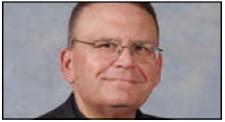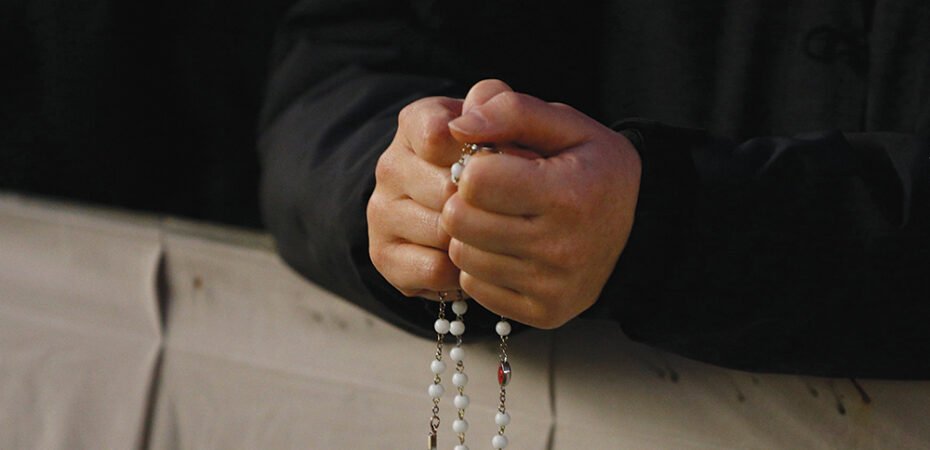Keeping the Fire Alive
Three components that may offer a solution
Msgr. Michael Heintz Comments Off on Keeping the Fire Alive
 What happened to that guy? We all can think of more than one brother in ministry who began his priesthood with zeal, excitement and energy, and who now, while faithful to the promises he made at ordination, is also bereft of that early fervor, showing little enthusiasm (and maybe even occasional disdain) for the work of priesthood, and — for want of a better way to put it — is just “mailing it in,” or “coasting,” taking the path of least resistance, and whose ministry is marked by a kind of creeping minimalism. What happened? Perhaps, like the Ephesians who are scolded in the Apocalypse (cf. Rv 2:4), there is, in the life of the priest, a grave danger of letting go of that first love. But what causes this to happen?
What happened to that guy? We all can think of more than one brother in ministry who began his priesthood with zeal, excitement and energy, and who now, while faithful to the promises he made at ordination, is also bereft of that early fervor, showing little enthusiasm (and maybe even occasional disdain) for the work of priesthood, and — for want of a better way to put it — is just “mailing it in,” or “coasting,” taking the path of least resistance, and whose ministry is marked by a kind of creeping minimalism. What happened? Perhaps, like the Ephesians who are scolded in the Apocalypse (cf. Rv 2:4), there is, in the life of the priest, a grave danger of letting go of that first love. But what causes this to happen?
This challenge admits to no simple answer, but I would like to offer thoughts on several things which, probably cumulatively and in combination, may contribute to this phenomenon.
I think it is easy for all of us to be worn down by the demands of priestly ministry. In the last couple of decades, even with the flowering of the collaborative support of lay ecclesial ministers, parish twinning or consolidation has meant that an individual priest is often responsible for multiple (and sometimes very diverse) communities, shuttling back and forth, trying to give equal time and attention to the various constituencies he serves. This itself places a great stress on him and may wear him down to the point where he, feeling inadequate to the task, is left just going through the motions.
The scandals erupting in 2002 that very publicly rocked the Church — and whose aftershocks continue to linger — may also contribute to a gnawing anxiety and lack of trust in the heart of many priests. Fear of false accusation, uneasy relationships with superiors and the constant negativity in the media toward the Church all serve to drive down priestly morale. This, too, may be a contributing factor in explaining why some of our brothers have simply dialed it back.
There is also what I consider the besetting sin of many clerics: resentment. It is the black hole in the heart of a priest. A real or perceived injury or slight, the feeling of being underappreciated by parishioners or overlooked by one’s superiors, and the typical clerical middle-age crisis of thinking that just about every parish looks better than one’s own, can each cause a small prick in the heart of the priest. Left unattended to, this slowly develops into a gaping black hole, and an abscess of resentment and cynicism. This certainly can countermand joy, zeal and enthusiasm for the work entrusted to us.
If these are some of the contributing factors, is there an antidote? I would suggest three components of priestly life that could contribute to a solution: fraternity, a habit of affirmation, and perseverance in prayer.
As priests, we need strong fraternal bonds with one another, bonds founded on more than shared tastes, habits or recreation. We are brothers in Christ. And he is the foundation of our fraternity. We cannot be lone rangers, seeking to go it on our own. We need fraternity and the trust, vulnerability and accountability that are fruits of genuine friendship. We can share our burdens and our joys, build one another up and also hold one another accountable, calling our brothers to holiness.
We also need to learn the habit of affirmation: a culture of gratitude should accompany our every interaction — certainly with brother priests (when was the last time we affirmed one of our confrères?), but also with everyone we encounter. Affirmation builds up. And when we need to give the hard word, when it emerges from a milieu of affirmation, it is much more readily received.
Finally, perseverance in prayer. It’s easy to make it the last priority on a busy day, especially when it has been dry. It’s easy to put it off when we’re tired. And once we start to let up in prayer, it becomes all the easier to rationalize our lack of attention to it. But the interior life — fidelity to prayer (I don’t mean just the Office, but personal prayer, time each day in conversation with the Lord) — is absolutely critical for our life as disciples. And when the priesthood is unmoored from its foundation in discipleship, only tragedy follows, certainly for the priest, and all too often for those entrusted to his care. So, no matter how tired, hurt, ashamed, frustrated, disappointed, angry or numb we feel: Never. Stop. Praying.
MSGR. MICHAEL HEINTZ, a priest of the Diocese of Fort Wayne-South Bend, serves as academic dean and director of intellectual formation at Mount St. Mary’s Seminary in Emmitsburg, Maryland.





